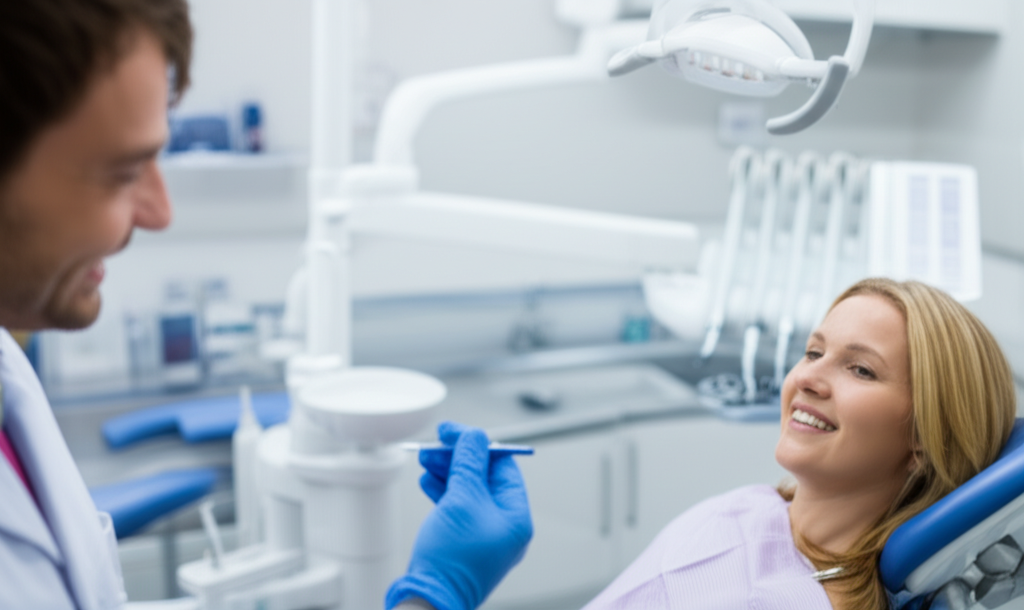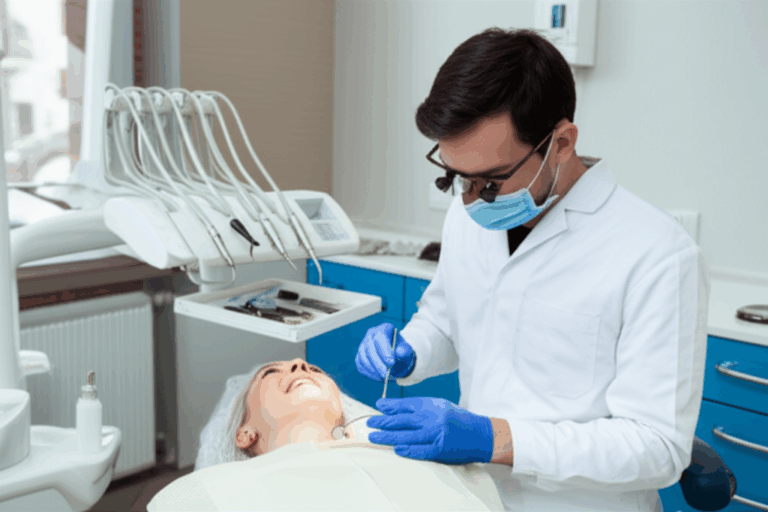
Are Dental Implants in Mexico Safe?
A Simple Guide for Anyone Thinking About Dental Care Abroad
Have you asked yourself, “Are dental implants in Mexico safe?” You’re not the only one. Many people look at Mexico for dental care because it’s much cheaper and sometimes high quality. But when it’s about your health—and your smile—it’s normal to feel unsure. Teeth aren’t like T-shirts or souvenirs. If something goes wrong, you can’t just swap them out.
Maybe you’re missing teeth or your bridges have worn down, and your friends who went to Mexico for dental work are really happy. At the same time, maybe you saw scary stories online: “How do I know if the dentists in Mexico are good? What if we don’t understand each other? Do the implants last as long as they do back home?” These are smart questions.
You deserve real answers—not just ads. You need a guide that lays out the facts, shows both the pros and cons, and helps you decide what is best for YOUR health and peace of mind. Let’s walk through it together.
In This Article
- Why People Go to Mexico for Dental Implants
- What Does “Safe” Really Mean for Dental Tourism?
- Understanding and Avoiding Risks
- How to Pick a Good Dental Clinic in Mexico
- From Start to Finish: The Implant Process
- Numbers and Stories: Success, Problems, and Patients’ Voices
- Should You Get Dental Implants in Mexico? What To Remember
Why People Go to Mexico for Dental Implants
So, why is dental tourism growing? It’s not just about the money—though that’s a big part.
Big Savings
One huge reason people head to Mexico for a new smile is price. Dental implants in the US usually cost between $3,000 and $6,000 per tooth. In Mexico, good clinics offer the same thing for $1,500 to $3,500. If you want a full set (an “All-on-4”), you could save over $10,000, even after paying for travel.
Close By & Not Hard to Get To
If you live in the US or Canada, Mexico is just over the border. Places like Tijuana, Los Algodones (“Molar City”), and Cancun are popular with dental tourists. There are clinics made for visitors, with staff who speak English and who can help with travel tips. Sometimes you can cross the border, get work done, and come home the same day.
Modern Clinics & Good Care
Don’t picture old, dusty clinics. The best Mexican clinics have new equipment like digital x-rays, 3D scans, and even digital dental lab connections. Lots of clinics proudly show off international memberships or badges. Some dentists trained in the US, Canada, or Europe and use the same brands as those at home.
Sounds great, doesn’t it? But what about safety? Here’s where you really need to pay attention.
What Does “Safe” Really Mean for Dental Tourism?
When we ask, “Are dental implants in Mexico safe?” we really want to know:
- Are the dentists good and experienced?
- Are the clinics clean?
- Is the care as good as what I’d get at home?
- What could go wrong, and how can I stop that from happening?
Let’s take a closer look.
How Dentists and Clinics Are Watched in Mexico
Dentists in Mexico are checked by COFEPRIS (Mexico’s health group). Top clinics, especially where tourists go, often use cleaning and safety rules just like in the US and Europe. Some even get extra proof called accreditation from groups like the American Association for Accreditation of Ambulatory Surgery Facilities International (AAAASF) or Joint Commission International (JCI). These are good signs that the clinic cares about your safety.
Who’s Doing the Work? Dentist Training & Skills
The best clinics show off their dentist’s background. You’ll find dentists who:
- Have extra training in putting in implants
- Belong to dentist groups (like the American Academy of Implant Dentistry or International Congress of Oral Implantologists)
- Go to classes to keep learning
Tip: Ask if your dentist belongs to the Asociación Dental Mexicana or has training from a US or Canadian group. It’s not rude—it’s just being smart.
Clean Tools & Lowering Infection
A big worry is infection. It comes down to how they clean their tools and keep the clinic clean. Good clinics use autoclaves (which clean with hot steam), gloves, covers, and filtered water. Ask about their methods. A good clinic will proudly show you.
The Implants: What Are They Made Of?
The stuff implants are made out of matters—a lot. The best clinics use strong, proven brands that are approved by the FDA or CE. Always ask for the brand name, and check it out. If you want to know more about how dental parts are made, check out an implant dental laboratory.
Speak Up!
You need to be able to talk with your dentist and understand them. Most places for tourists have people who speak English, but mistakes can still happen. Make sure you understand what’s happening before you agree. If it isn’t clear—ask again!
Understanding and Avoiding Risks
Even great clinics can’t promise nothing will go wrong. But knowing what might happen—and how to lower the risks—really helps.
Infection & Slow Healing
The main problem with implants is infection in the gum. Good clinics keep their infection rates low (like in the US or Canada) if they use strong cleaning rules. Pick a clinic with good hygiene steps.
Bad Materials or Cheap Work
Saving money sometimes means corners are cut. Stay away from clinics that:
- Have prices much lower than the average
- Won’t tell you what kind of implant they use
- Avoid answering your questions
You want a fair price and good quality.
Surprises in Price & Warranties
Always ask:
- Am I getting a full written treatment plan?
- Is the price for everything, including checkups and x-rays?
- What if the implant fails or there are problems?
Many good clinics offer warranties, but you should double check.
Travel Problems
Dental tourism isn’t just about the clinic. Think about:
- Getting travel insurance that covers medical troubles
- Staying out of risky areas, especially alone
- Allowing time to rest after treatment
Checkups & Aftercare
Implants aren’t a one-time thing. The bone needs time to heal, which can take months. You might need to come back for more appointments. Ask the clinic if they do remote (online) check-ins, or if you would need to see a dentist at home after.
How to Pick a Good Dental Clinic in Mexico
If you remember only one thing: The clinic you pick is more important than the country. Here’s how to choose well:
1. Start with Research
Use Google or look at websites for people who go abroad for dental work. Read real, recent patient stories—not just short, glowing reviews. Look for details about the care at each step.
2. Check Dentist Experience
Ask:
- Where did you learn to do implants?
- Do you belong to any dentist groups?
- Can I see examples of implants you’ve done?
Just like hiring a mechanic or builder—experience counts!
3. Look at Their Cleanliness
A good clinic will show you their cleaning area if you ask (even in a video). Ask how they do x-rays, 3D scans, or work with a digital dental lab. Don’t let them be vague.
4. Don’t Be Fooled by Low Prices
Get it in writing: what’s included in the price, what brand of implant is used, and if extra visits are needed. Make sure the plan is actually right for your mouth—not just your wallet.
5. Make Sure You Can Communicate
You shouldn’t feel pushed too fast. A good dentist will answer every question, from travel to how to care for your mouth after.
6. Try a Phone or Video Call Consultation
A lot of clinics will talk to you over a video call before you come. This helps you get a feel for the place and the dentist.
7. Ask About Warranties
Ask:
- Is there a warranty if something goes wrong?
- What aftercare is there, either in person or online?
- If there is a problem, how does the clinic fix it?
It might feel odd to bring this up—but it’s super important.
8. Think About a Dental Tourism Helper
If this is all new for you, think about using an agency that helps people get dental care abroad. They can help with paperwork, pick out good clinics, and be someone to call if you need help.
From Start to Finish: The Implant Process
Worried about what will happen? Here’s a simple breakdown.
Step 1: First Meeting
The dentist will look at your health and teeth, take x-rays or scans, and talk about your goals. Sometimes your jaw might need extra work before the implant, like adding more bone.
Step 2: Planning & Cost
The dentist gives you a written plan, saying what will be done, how much it costs, and what kind of implants they use.
Step 3: Implant Surgery
After numbing your mouth, the dentist puts the implant into your jaw. This doesn’t usually hurt much, thanks to new methods.
Step 4: Healing
Now you wait for a few months, letting the bone heal around the implant.
Step 5: Adding the Tooth
After your jaw is ready, the final crown, bridge, or denture goes on. It will look like your real teeth.
Step 6: Care After
The clinic will give you rules for care, eating, and follow-ups. Many clinics check on you online to make sure you’re healing okay.
Numbers and Stories: Success, Problems, and Patient Voices
Let’s look at what really happens:
– How Often Implants Work
Most studies show good clinics in Mexico have implants that work well over 5–10 years (95-98% success). This is just as good as in the US or Canada.
– Infection
Top clinics have infection rates as low as big US/Canada clinics—if they have good cleaning rules. Risk goes up if the place is less careful.
– Implant Brands
Well-known Mexican clinics often use big brands like Nobel Biocare or Straumann—just like in North America or Europe. Always ask what yours will be.
– Dentist Training
A lot of dentists in big dental tourism cities in Mexico have advanced training or learned in the US/Europe. Check their background—it should be easy to confirm.
– Possible Problems
Troubles can happen anywhere:
- Swelling or some pain (normal)
- Nerve damage (rare)
- Implant that doesn’t “take” in your jaw (happens less than 5% where clinics are good)
These risks aren’t just a Mexico thing—they happen everywhere implants are placed, but trained dentists lower the risk.
– What Patients Say
Happy patients often talk about:
- Dentists taking time to explain things
- Clinics that look clean and modern
- Bills with no surprises
- Friendly, relaxed care
Unhappy reviews are mostly about clinics chosen for the rock-bottom price—and because the patient didn’t check reviews or experience.
– Costs
Even after travel costs, dental implants in Mexico can be 50–70% less than the US. For lots of people, that means finally getting a smile they love.
Should You Get Dental Implants in Mexico? What To Remember
You’ve read a lot, so you must really care about your health—not just the lowest price. Think about this:
Who Is a Good Fit?
Implants could be good for you if:
- You’re missing teeth and want something permanent
- You’re in good health with strong gums and jawbone
- You don’t smoke (or are willing to quit)
- You’re okay with traveling for your dental work
If you have some health problems, talk to your dentist. Implants aren’t perfect for everyone, but many people can get them.
Think About the Pros and Cons
The biggest upside: it costs less and, in good clinics, can be just as good as home. But you also have to be okay with travel, different languages, and doing your own digging to pick a good clinic.
More Than Price
- Do you have time for one or more trips to Mexico?
- Would saving money matter if there were problems later? Can you get help back home in that case?
- Will you make the effort to really check up on your clinic and dentist?
A Short Checklist
- Check the clinic: Find clinics with lots of good reviews and real credentials.
- Ask questions: Understand your whole treatment plan before saying yes.
- Be careful about care: Keep your mouth healthy and do follow-ups for the best results.
- Don’t just look at price: Saving money matters, but not if it risks your health.
- Trust your feelings: If something feels not right, look somewhere else.
Frequently Asked Questions
Q: If dental care in Mexico is so cheap, is it safe?
A: The lower cost is mostly because things cost less to run in Mexico—not because quality is worse, as long as you choose a proven clinic with real skills. Really cheap clinics with zero background are the ones that cause most problems.
Q: How do I check if a clinic is good?
A: Look for international awards, ask about cleaning and safety rules, and check what implant brand they use. Good clinics are happy to answer.
Q: What about after the implant?
A: Ask before treatment about aftercare, if you can do any check-ups online, and what would happen if you had trouble later—get this in writing.
Q: Can I bring my own dental work or tooth?
A: Most good clinics work with respected dental ceramics labs or use their own digital tools. If you want something special, talk about it in your meeting.
Last Words: Helping You Make The Right Choice
Safe and successful dental implants in Mexico are very possible—if you pick good clinics, research, and ask questions. If you skip this detective work, it can cost you more later.
Don’t go into it alone or without good info. Start by learning all you can. Make a checklist. Talk to people you trust who went before you. Speak honestly with dentists here and in Mexico.
And when you’re ready? Take the next step to get your smile—and your confidence—back. No matter where you go, you’ll feel better knowing you made an informed choice.
Ready to start? Contact good clinics, set up video chats, and get the facts! A little homework now means your teeth—and your nerves—are in good hands.
> Medically reviewed by [Dr. Jane Doe, DDS].
> This article is for learning only. Talk to your dentist for advice made just for you.






